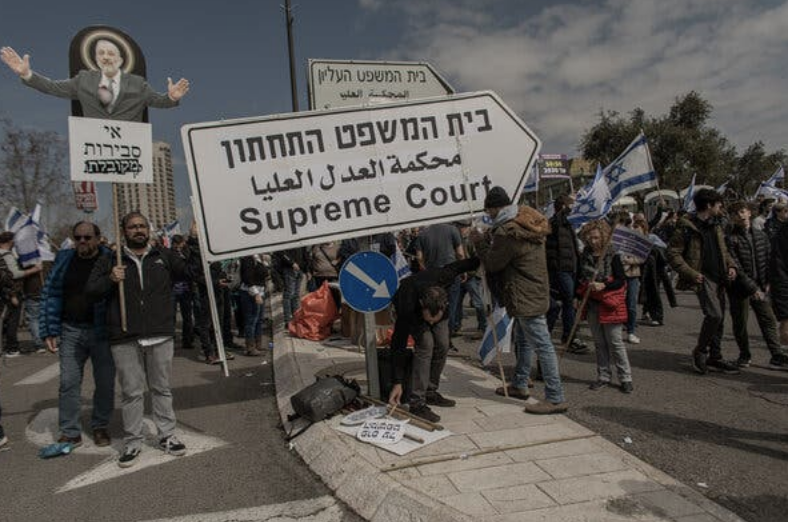Judicial Reform in Israel Sparks Mass Anti-Government Protests
Demonstrators gather in Jerusalem to protest the proposed judicial reforms. Photo: Avishag Shaar-Yashuv/ New York Times
On Saturday night, over 150,000 people took to the streets of Tel Aviv in the largest anti-government protests yet in response to the current government’s proposed judicial overhauls. Advocates see the reforms as a balancing of the scales, or a check on Israel’s Supreme Court’s supposed judicial overreach.
Critics, on the other hand, argue that the Supreme Court remains the only check on legislative power, given that Israel operates on a unicameral legislature system. They also claim that the face of the reform movement, Prime Minister Benjamin Netanyahu, could extricate himself from corruption charges if the government gains more control over the judiciary.
This has not been lost on Israel’s attorney general, who has barred Netanyahu from any involvement in legislating the judiciary, citing a conflict of interest. Since Netanyahu’s election in Nov. 2022, his government has put judicial reform at the top of its agenda. The proposals include changes to several aspects of the judicial process, including the structure of the Supreme Court’s selection committee for judges, limits on the Court’s ability to exercise judicial review, and a weakening of the attorney general’s authority.
Netanyahu and his fellow coalition members have dismissed the public outcry. Many Israelis fear that these reforms reflect a deeper shift in the state’s character away from democratic values. In response Netanyahu has criticized the protests, asserting that, “demonstrators who talk about democracy are themselves bringing about the end of democracy when they deny elected delegates the fundamental right in a democracy - to vote.”
Religious Zionist Party Knesset member Simcha Rothman, considered the architect of the reform bills proposed in Jan., has expressed similar disapproval of the demonstrations. “We’re not moving Israel from normal to extreme; we’re moving Israel from extreme to normal. What we have today is a judicial tyranny in Israel,” he said to the Jerusalem Post last week.
Protests in Tel Aviv’s Dizengoff Square on Saturday night. Photo: Time/ Mostafa Alkharouf-Anadolu Agency
Israel’s right-wing has previously been at odds with Supreme Court decisions that have limited settlement development in the West Bank, and members of the ultra-Orthodox community have criticized the Court for not implementing an absolute exemption from military service for all men enrolled in Torah studies. The proposed revisions, however, are not a rejection of the Court’s rulings on political issues, but rather a reconstruction of the underlying judicial system in its entirety.
The selection committee responsible for judicial appointments to the Supreme Court currently consists of nine members including judges, representatives from the Bar Association, members of parliament, and government ministers. Netanyahu’s administration hopes to revise the selection process by granting government representatives an automatic majority, giving them the primary authority of appointments.
They also intend to abolish the Court’s ability to counter government decisions on the grounds of “unreasonability”, the common understanding of ethical standards derived from Israel’s Basic Laws. Without a formal written constitution, Israel instead relies on a set of Basic Laws passed by the Knesset over time, many of them critical to human and civil rights.
In the 1990s, the Supreme Court asserted its power to exercise judicial review when normal legislation contradicts the Basic Laws. If the government strips the Court of this power, Israelis worry that right-wing politicians could pass controversial legislation with little opposition.
Leaders from various sectors of the public are already emphasizing the dangers of judicial reform. Members of the Knesset, including opposition leader Yair Lapid, are joining the demonstrations. Israel’s tech sector, which has traditionally avoided politics, has participated in weekly protests endorsed by over 130 companies.
The head of Israel’s central bank has expressed concern that judicial reforms will undermine investor confidence in Israel, and this seems to be a credible fear. Just last week, Assaf Rappaport, the CEO of the prominent cybersecurity company Wiz announced that investors pressured the company to take precautions amid the political uncertainty, prompting Wiz to transfer its business accounts abroad. Even S&P Global Ratings’ primary credit analyst stated that the reforms could affect the country’s future credit rating.
Despite the grassroots support across Israel for the protests, Arab-Israelis have been largely absent from the movement. Many activists have urged protestors to keep the Palestinian issue separate to ensure widespread participation, but for Arab-Israelis the issue of unchecked government power, especially in the hands of a right-wing government, and Palestinian rights, are inextricably tied.
A member of the Jaffa City Council and political activist, Abed Shehadeh, criticized the current protests, “What happens in the West Bank and Gaza resonates for us in a way it doesn’t for them…There’s no sense among the people demonstrating that they understand what’s happening in politics now is a logical development in a society that systematically oppresses others.”


